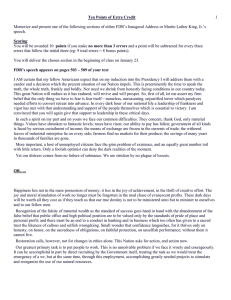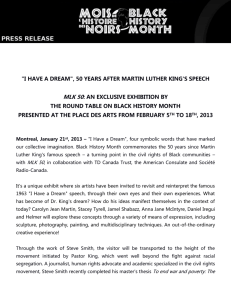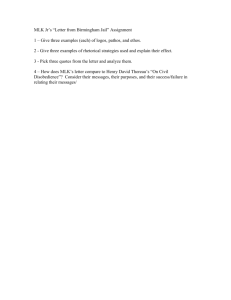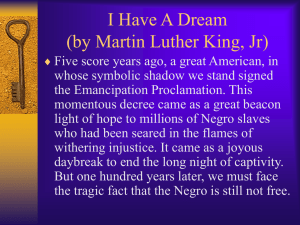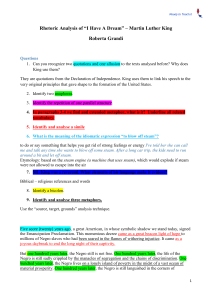MLK's 'I Have a Dream' Speech Analysis Guide
advertisement
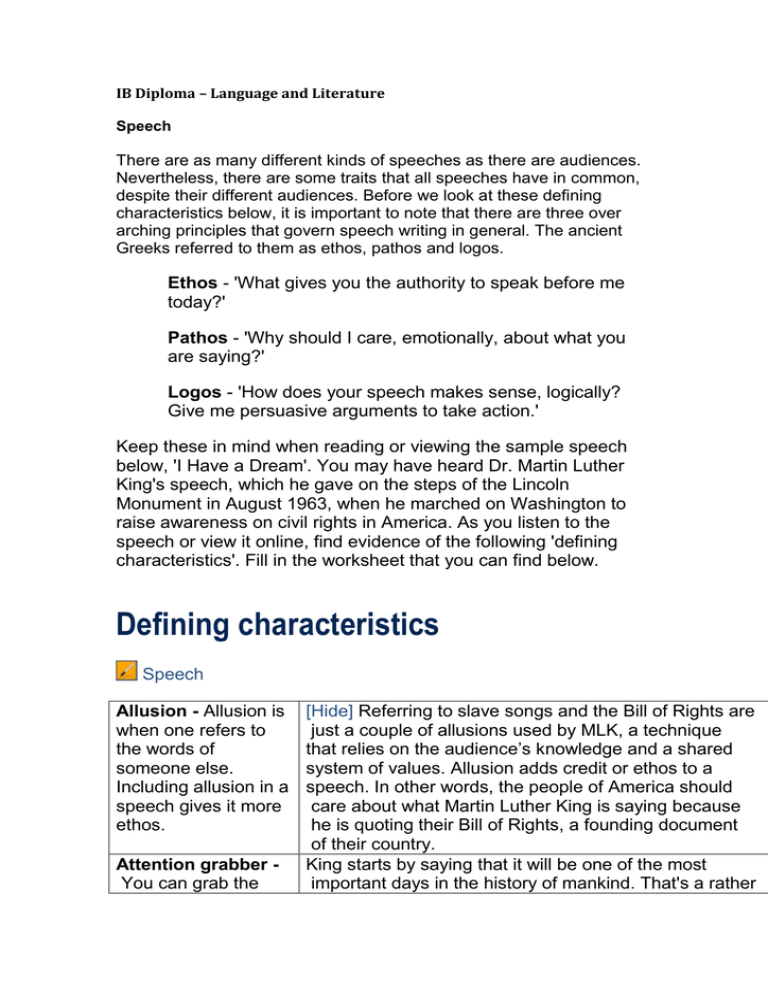
IB Diploma – Language and Literature Speech There are as many different kinds of speeches as there are audiences. Nevertheless, there are some traits that all speeches have in common, despite their different audiences. Before we look at these defining characteristics below, it is important to note that there are three over arching principles that govern speech writing in general. The ancient Greeks referred to them as ethos, pathos and logos. Ethos - 'What gives you the authority to speak before me today?' Pathos - 'Why should I care, emotionally, about what you are saying?' Logos - 'How does your speech makes sense, logically? Give me persuasive arguments to take action.' Keep these in mind when reading or viewing the sample speech below, 'I Have a Dream'. You may have heard Dr. Martin Luther King's speech, which he gave on the steps of the Lincoln Monument in August 1963, when he marched on Washington to raise awareness on civil rights in America. As you listen to the speech or view it online, find evidence of the following 'defining characteristics'. Fill in the worksheet that you can find below. Defining characteristics Speech Allusion - Allusion is when one refers to the words of someone else. Including allusion in a speech gives it more ethos. Attention grabber You can grab the [Hide] Referring to slave songs and the Bill of Rights are just a couple of allusions used by MLK, a technique that relies on the audience’s knowledge and a shared system of values. Allusion adds credit or ethos to a speech. In other words, the people of America should care about what Martin Luther King is saying because he is quoting their Bill of Rights, a founding document of their country. King starts by saying that it will be one of the most important days in the history of mankind. That's a rather audience's attention in several ways, with a quote, a joke, or a big, bold statement. Bond - Gaining a rapport with your audience is easier when you say inclusive plurals like ‘we’, ‘our’, or ‘us’. Bond is very much a part of ethos. Destination - Where is this speech going? Why should people continue to listen? Figurative speech Using metaphors and similes is one way of making abstract ideas become concrete. Parallelisms - A parallelism is grammatical construction in which the form of several sentence parts line up nicely in a sequence. Anaphora - This refers to the repetition of a particular idea or phrase. Varied sentence length - Long sentences with many clauses, which state several points related to the main point like this one, can become highly effective when bold statement. Besides referring to the common destiny of blacks and ‘our white brothers’, MLK also talks about ‘one great nation’ and repeats the word ‘together’. King sets the stage. He refers to Lincoln's promise and says it is a broken promise. We want to know why it is broken, and so we listen on. ‘Injustice’ cannot literally be hot, nor can oppression be ‘sweltering’. That is way we call this type of talk ‘figurative’ speech. MLK’s speech is full of it. In the sentence that reads, ‘With this faith we will be able to work together, to pray together, to struggle together, to go to jail together, to stand up for freedom together, knowing that we will be free one day,’ we see the infinitive verb used five times followed by the adverb ‘together’. ‘I have a dream’ are the words we remember from this speech because MLK repeats them poetically. In essay writing this stylistic device is not usually encouraged. For the spoken language we see that it works quite nicely. We see MLK doing this at the end of the fourth paragraph when he says, ‘We cannot walk alone.’ off-set with a kind of powerful punchy small sentence that follows shortly thereafter. This is one. Sample speech I Have a Dream Martin Luther King 1963 I am happy to join with you today in what will go down in history as the greatest demonstration for freedom in the history of ournation. Five score years ago, a great American, in whose symbolic shadow we stand today, signed the Emancipation Proclamation. This momentous decree came as a great beacon light of hope to millions of Negro slaves who had been seared in the flames of withering injustice. It came as a joyous daybreak to end the long night of their captivity. But one hundred years later, the Negro still is not free. One hundred years later, the life of the Negro is still sadly crippled by the manacles of segregation and the chains of discrimination. One hundred years later, the Negro lives on a lonely island of poverty in the midst of a vast ocean of material prosperity. One hundred years later, the Negro is still languishing in the corners of American society and finds himself an exile in his own land. So we have come here today to dramatize a shameful condition. We must forever conduct our struggle on the high plane of dignity and discipline. We must not allow our creative protest to degenerate into physical violence. Again and again we must rise to the majestic heights of meeting physical force with soul force. The marvelous new militancy which has engulfed the Negro community must not lead us to distrust of all white people, for many ofour white brothers, as evidenced by their presence here today, have come to realize that their destiny is tied up with our destiny and their freedom is inextricably bound to our freedom. We cannot walk alone. [...] I have a dream that one day this nation will rise up and live out the true meaning of its creed: "We hold these truths to be self-evident: that all men are created equal." I have a dream that one day on the red hills of Georgia the sons of former slaves and the sons of former slave owners will be able to sit down together at the table of brotherhood. I have a dream that one day even the state of Mississippi, a state sweltering with the heat of injustice, sweltering with the heat of oppression, will be transformed into an oasis of freedom and justice. I have a dream that my four little children will one day live in a nation where they will not be judged by the color of their skin but by the content of their character. I have a dream today. I have a dream that one day, down in Alabama, with its vicious racists, with its governor having his lips dripping with the words of interposition and nullification; one day right there in Alabama, little black boys and black girls will be able to join hands with little white boys and white girls as sisters and brothers. I have a dream today. I have a dream that one day every valley shall be exalted, every hill and mountain shall be made low, the rough places will be made plain, and the crooked places will be made straight, and the glory of the Lord shall be revealed, and all flesh shall see it together. This is our hope. This is the faith that I go back to the South with. With this faith we will be able to hew out of the mountain of despair a stone of hope. With this faith we will be able to transform the jangling discords of our nation into a beautiful symphony of brotherhood. With this faith we will be able to work together, to pray together, to struggle together, to go to jail together, to stand up for freedom together, knowing that we will be free one day. This will be the day when all of God's children will be able to sing with a new meaning, "My country, 'tis of thee, sweet land of liberty, of thee I sing. Land where my fathers died, land of the pilgrim's pride, from every mountainside, let freedom ring." (You may want to view a video recording of Martin Luther King giving this speech in Washington D.C in 1963 online)
